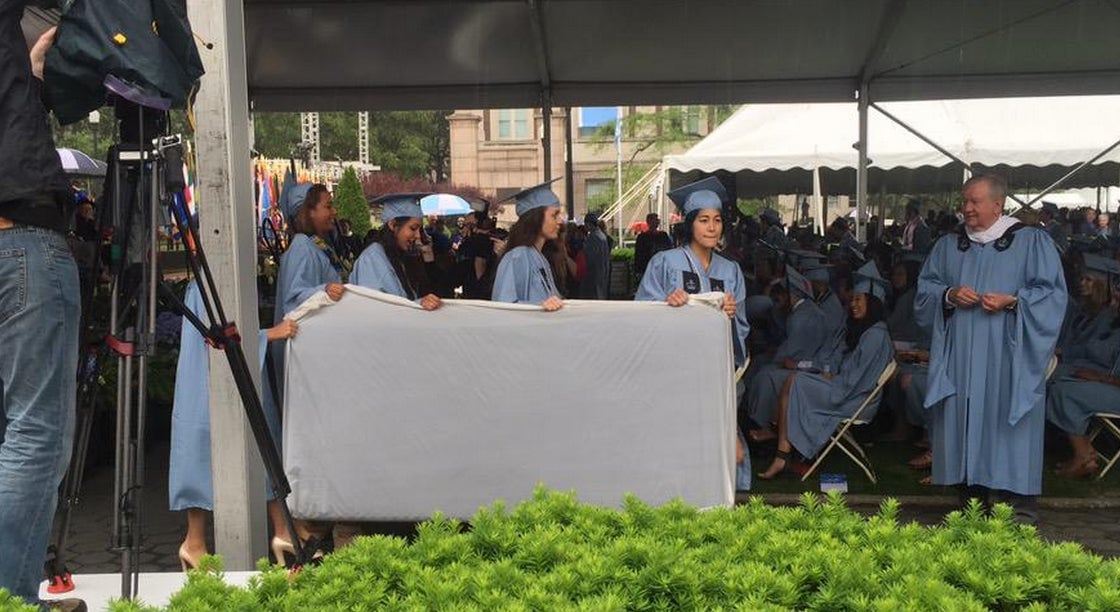Columbia University student Emma Sulkowicz carried her mattress across her graduation stage
A man accused by another Columbia student of raping her walked across the New York City university’s stage in a cap and gown yesterday (May 19), to receive a class of 2015 pin during Class Day, one of this week’s graduation events.


A man accused by another Columbia student of raping her walked across the New York City university’s stage in a cap and gown yesterday (May 19), to receive a class of 2015 pin during Class Day, one of this week’s graduation events.
A few minutes later, the woman who alleges that he raped her walked across the same stage carrying a mattress, a sign of the burden she has carried as a student since her sophomore year, when she says the rape happened.
Emma Sulkowicz has been carrying the mattress with her to all her classes since the beginning of this school year, in a performance art piece that was also her senior thesis. She said she would carry the mattress around campus until she and her alleged rapist no longer attended the same school.
She and others have argued that should have happened with his expulsion. But it didn’t happen until both students graduated.
The college conducted an investigation and hearing and cleared the accused student, Paul Nungesser (whose name has widely been reported in the press), of wrongdoing in this case and two others brought against him (paywall).
Whichever party is telling the truth, the story that ends with Sulkowicz carrying her mattress across that stage is one that speaks to the many frustrations of sexual assault survivors on US campuses.
In the 2013-14 fiscal year alone, the US Department of Education’s office for civil rights received 854 complaints (pdf, pg. 24) alleging misconduct in schools’ treatment of sexual and gender harassment, and sexual violence. The department is currently investigating Columbia University and 110 other colleges for their handling of sexual violence, department spokesman Jim Bradshaw tells Quartz via email.
Rape is often a very difficult crime to prosecute—witnesses are rare, and definitions and societal understanding of what assault is vary to the point of confusing both a survivor and a jury.
A 2007 survey (pdf) of two college campuses found that survivors may not even know that what happened to them was an assault, and are unlikely to pursue charges or university action. The researchers asked about specific experiences, and classified them as assault if the victim experienced unwanted sexual contact. In the chart below of unreported assaults, “forced” refers to assaults that happened through “physical force (or threats of physical force)” and “incapacitated” refers to “any unwanted sexual contact occurring when a victim is unable to provide consent or stop what is happening because she is passed out, drugged, drunk, incapacitated, or asleep.”

Critics say that colleges are often ill-equipped to handle sexual assault cases, and the accuser is burdened with deciding whether to pursue criminal charges, a school investigation, both, or none. Besides the low chances of prosecutors successfully pursuing the case, there is the psychological effect of having to relive an assault during the legal process.

Sulkowicz did report the incident to Columbia, and she told New York Magazine’s the Cut last year that the university botched the investigation. She later reported it to police, but said she did not press the district attorney’s office to pursue charges against her alleged attacker because of the amount of time the investigation would take, and her negative experiences talking to police.
“I decided I didn’t want to pursue it any further because they told it me it would take nine months to a year to actually go to court, which would be after I graduated and probably wanting to erase all of my memories of Columbia from my brain anyway, so I decided not to pursue it.”
Last month Paul Nungesser filed a gender discrimination lawsuit against the school for its lack of support against what he calls Sulkowicz’s “harassment campaign.”
Columbia University provided the following statement to Quartz about the yesterday’s Class Day stage incident. (The school had sent an email asking students not to bring “large objects” to the ceremonies):
We communicated to all students that the shared celebratory purpose of Class Day and Commencement calls for mutual respect for the security and comfort of graduating students and their families in attendance. We are not going to comment on individual students; it is a day for all members of the Class of 2015. We were not going to physically block entry to graduates who are ultimately responsible for their own choices.
Quartz has reached out to Sulkowicz for comment and will update this post with any response.
Nungesser’s attorney, Andrew Miltenberg, tells Quartz, “It’s very disappointing that Columbia has allowed Ms. Sulkowicz to continue to harass and bully Mr. Nungesser after he was found not responsible for her allegations.”
Sulkowicz told the AP last month that her art piece wasn’t meant to intimidate Nungesser. “It’s ridiculous that he would read it as a ‘bullying strategy,’” she said, “when really it’s just an artistic expression of the personal trauma I’ve experienced at Columbia.”
She told the New York Times yesterday that her art piece is now complete.